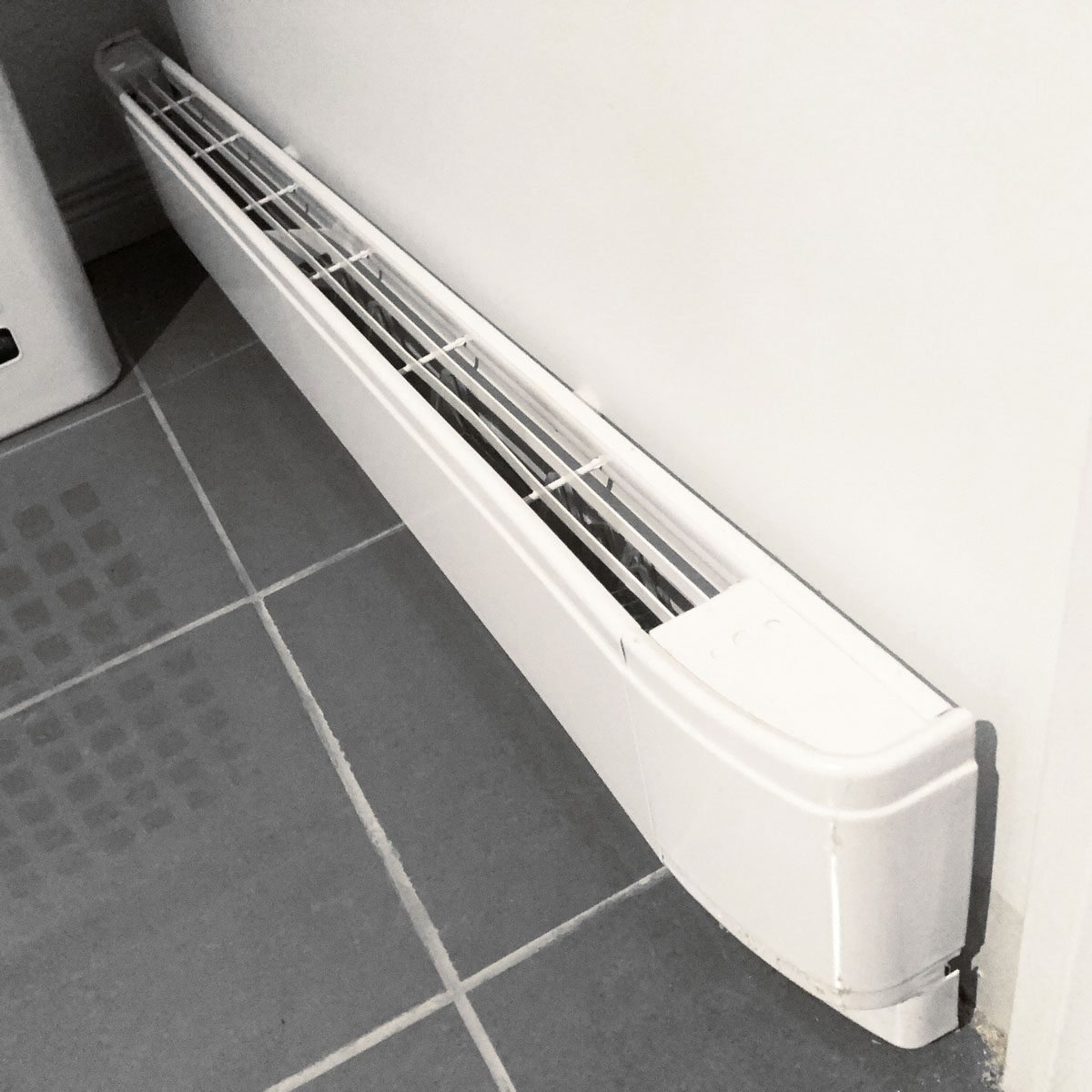Yes, electric baseboard heat is efficient. It uses less energy than other heating methods and is less expensive to operate. Additionally, electric baseboard heaters are safe and easy to use.
Electric baseboard heat is an efficient way to heat your home. It uses electricity to generate heat, which is then distributed through a system of baseboard units placed around the perimeter of your home. This type of heating is very efficient because it doesn’t lose any heat through ductwork or windows.
Additionally, electric baseboard heaters are very easy to install and maintain.
Do Electric Baseboard Heaters Use a Lot of Electricity?
Electric baseboard heaters are one of the most popular types of home heating systems, but many people worry that they use a lot of electricity. While it’s true that electric baseboard heaters do use more electricity than other types of heaters, they are still an efficient way to keep your home warm. Here’s a look at how electric baseboard heaters work and how much electricity they use.
Electric baseboard heaters work by using resistive coils to convert electrical energy into heat. The coils are made of metal with a high resistance to electricity, which means that they get very hot when electricity is passed through them. The coils are located inside a metal housing, and when the heater is turned on, the coils heats up the air inside the housing.
This heated air is then circulated around the room by convection, providing warmth to the room.
So how much electricity do electric baseboard heaters use? It depends on several factors, including the size of the heater and the amount of time it’s used.
However, in general, electric baseboard heaters use about 1-2 kWh of electricity per hour (kWh stands for kilowatt hour). For comparison, a typical home uses about 30 kWh of electricity per day. So while electric baseboard heaters do use more electricity than other types of heaters, they’re still relatively efficient.
If you’re worried about your electric bill going up too much if you use an electric baseboard heater, there are a few things you can do to minimize its impact. First, make sure that your heater is properly insulated so that as muchheat as possible stays inside the room instead of escaping through walls or windows. Second, only turn on your heater when you need it – don’t leave it running all day long just because it’s cold outside.
Finally, consider using a timer so that your heater only comes on when you need it and shuts off automatically when you don’t – this can help save both energy and money.
What is the Disadvantage of Baseboard Electric Heat?
There are several disadvantages to baseboard electric heat, including high costs, inefficiency and safety concerns.
Electricity is one of the most expensive forms of energy, so using it for heating can be quite costly. Additionally, baseboard heaters are not very efficient at converting electricity into heat, so a lot of energy is wasted.
Finally, there are safety concerns with electric baseboard heaters. If they are improperly installed or maintained, they can pose a fire hazard. Also, if you have young children or pets, you need to be careful that they do not touch the heater as it can get very hot and cause burns.
Is It Expensive to Run Electric Baseboard Heat?
Electric baseboard heaters are one of the most popular types of home heating systems. They’re relatively inexpensive to install and operate, and they provide a comfortable, even heat. But how much do they really cost to run?
The answer depends on a few factors, including the type of electric baseboard heater you have, the size of your home, the climate you live in, and how efficiently you use your heater. Let’s take a closer look at each of these factors:
Type of electric baseboard heater: There are two main types of electric baseboard heaters – hydronic (hot water) and electric resistance.
Hydronic baseboard heaters are more expensive to operate because they require a hot water source (usually from your home’s boiler or water heater). Electric resistance heaters are less expensive to operate because they don’t require a hot water source.
Size of your home: The larger your home, the more expensive it will be to heat with an electric baseboard heater.
This is because larger homes require more energy to heat up.
Climate you live in: If you live in a cold climate, it will cost more to run your electric baseboard heater than if you live in a warm climate. This is because colder climates require more energy to maintain a comfortable temperature.
Why are Electric Baseboard Heaters Inefficient?
There are many reasons why electric baseboard heaters are considered inefficient. One reason is that they use resistive heating, which means that they convert electrical energy into heat by resistively heating a wire element. This process is not very efficient because it results in a lot of wasted energy as heat is lost through the metal casing of the heater.
Additionally, electric baseboard heaters tend to be less effective at heating a room evenly than other types of heaters such as forced air furnaces. This is because they rely on convection to circulate warm air throughout the room, which can often result in hot and cold spots.

Credit: www.familyhandyman.com
Electric Baseboard Heat Cost Per Month
If you’re considering electric baseboard heat for your home, you’re probably wondering about the cost. Here’s a breakdown of what you can expect to pay each month.
For a standard 1,500-square-foot home, you’ll need about 25 linear feet of baseboard heating.
This will cost between $45 and $65 per month to operate.
If you live in a colder climate, your monthly costs will be higher. For example, in a 2,000-square-foot home in Vermont, you’ll need about 36 linear feet of baseboard heating.
This will cost between $70 and $95 per month to operate.
In general, electric baseboard heat is more expensive to operate than other types of heating systems (like natural gas or oil). But it has some advantages over these other systems.
First, it’s very efficient – all the heat goes directly into your rooms (unlike furnaces which have to heat the entire house). Second, it’s easy to install and doesn’t require any special ventilation. Finally, electricbaseboardheat is safe and clean – there’s no risk of gas leaks or carbon monoxide poisoning.
Should I Buy a House With Electric Baseboard Heat
If you’re considering buying a home with electric baseboard heat, there are a few things you should keep in mind. First, electric baseboard heat is generally more expensive to operate than other types of heating systems. Second, electric baseboard heat can be less comfortable than other types of heat, so you’ll want to make sure your home is well-insulated.
Finally, electric baseboard heat may not be the best choice if you have young children or pets, as they can easily knock over the units and cause serious injury.
Electric Baseboard Heaters With Thermostat
Baseboard heaters are an efficient way to heat your home. They work by circulating hot water or electric current through a system of pipes and radiators. Baseboard heaters with thermostats help regulate the temperature in your home, so you can stay comfortable all winter long.
Here are some things to consider when choosing an electric baseboard heater with thermostat:
1. Size: Heaters come in a range of sizes, so it’s important to choose one that will be adequate for the space you need to heat. Consider the size of the room, the height of the ceilings, and the insulation of your home when selecting a heater.
2. Type: There are two types of baseboard heaters: hydronic and electric. Hydronic units use hot water to create warmth, while electric units use electricity. Both types are effective, but each has its own set of pros and cons.
Consider your needs before making a decision.
3 . Temperature control: A good quality thermostat will allow you to control the temperature of your heater, so you can keep your home at a comfortable level all winter long.
Look for a model with easy-to-use controls and precise temperature settings.
4 . Safety features: Some models come with built-in safety features like tip-over switches and overheat protection devices.
These can give you peace of mind knowing that your family is safe from harm if something goes wrong with the heater.
Conclusion
Electric baseboard heaters are one of the most popular types of home heating systems, but there is some debate about how efficient they actually are. Some people believe that electric baseboard heat is not as efficient as other types of heating, such as natural gas or oil-fired furnaces. Others believe that electric baseboard heat can be just as efficient as any other type of heating system if it is used correctly.
There are a few things to consider when trying to determine the efficiency of electric baseboard heat. First, you need to think about the cost of electricity in your area. If electricity rates are high, then electric baseboard heat may not be the best option for you.
However, if electricity rates are relatively low, then electric baseboard heat can be a very efficient way to heat your home.
Another thing to consider is the size and layout of your home. If you have a large home with many rooms, electric baseboard heat may not be the most practical option because it can be expensive to run multiple units.
However, if you have a smaller home or an open floor plan, electricbase board heat can work well because it can provide evenheat throughout the space without having to worry about ductwork or vents.
Finally, you need to think about how well insulated your home is. If your home is poorly insulated, then any type of heating system will likely be less efficient because more energy will be needed to maintain a comfortable temperature inside.
Conversely, if your home is well-insulated, then anelectricbase board heater canbe just asefficientas any other typeof heaterbecause lessenergywill be neededto keepyourhome warm . Overall , whether ornot electrictyis afuel -efficientwaytoheatelectricitydepends on localcosts and howwellyourhomeholdsinheat .
